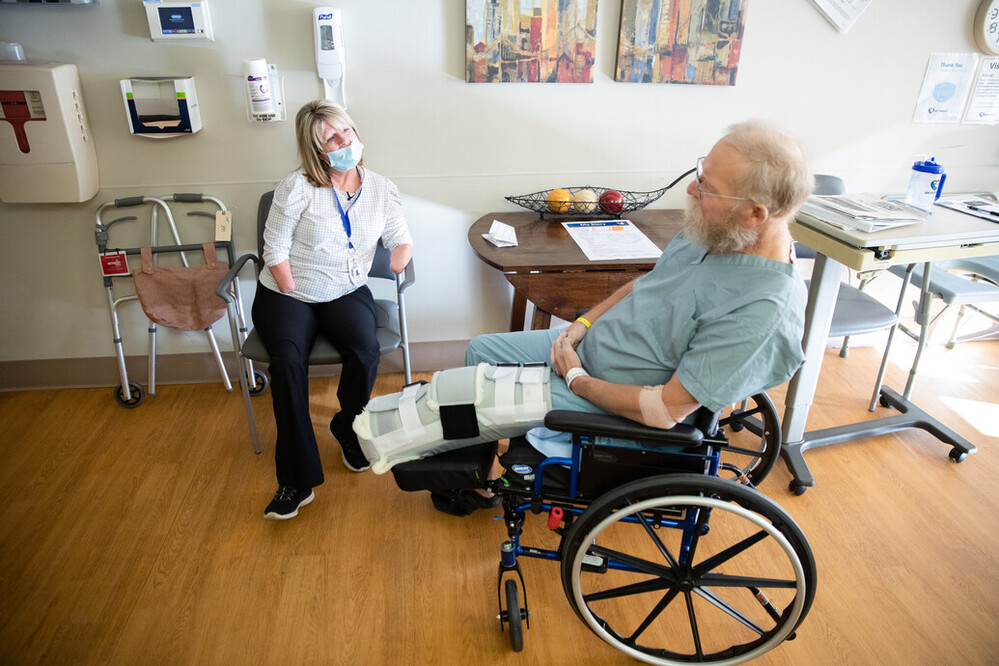
The Meaning of Care Magazine
‘Incredible Grit’: After Quadruple Amputation, She’s Thriving and Encouraging Others Facing Health Challenges
Published: Dec. 12, 2022
Teri Roberts walked into John Wipfler’s hospital room on Sept. 28 as a complete stranger, but with a purpose.
As she began chatting with John, she learned that he had arrived at the Methodist Acute Rehabilitation Center two days earlier after a harrowing few months of health issues. An infected cut on his left foot in June became septic over the summer, and by mid-September, his lower left leg had to be amputated. Further, he had suffered several minor strokes before coming to Methodist Hospital. Now, nearly three weeks since his amputation, John was adjusting to his new reality, trying to stay positive but dealing with his uncertain future.
When Roberts walked in, John immediately saw someone he could relate to. He saw that she had no hands, and she soon revealed that she walked with prosthetic legs. But she kept the focus on him, listening intently to the details of his journey before offering some optimism.
“But you’re still here with us,” she said. “You’re at one of the best places you can be for this. I’m living proof.”
On the Brink of Death
Roberts has volunteered at the Acute Rehabilitation Center for the past three years, visiting weekly to encourage patients like John with her positive attitude, faith and sometimes blunt sense of humor. It’s a role she’s uniquely suited for after her own life-changing health scare.
In late 2014, Roberts became sick with what she thought was the flu. She actually had a group A Streptococcus infection – perhaps from a hangnail, she thinks – that led to sepsis and toxic shock syndrome. She spent 12 days in a coma in the Methodist Hospital Critical Care Unit, and her family was preparing to say goodbye a few days before Christmas.
“I wasn’t expected to survive, but I did,” she said. “I came out of the coma just hours before they were going to remove me from life support. I kept telling my husband, ‘You can’t get rid of me that easy.’”
Roberts was alive, but her challenges were just beginning. Her liver and kidneys had begun shutting down while she was intubated, and the lack of blood flow caused her hands and feet to become gangrenous. Over the next few weeks, Roberts recovered from the infection, and her liver and kidneys began functioning again. But for her blackened extremities, amputation was the only solution.
Roberts accepted the news but wasn’t interested in dwelling on it. She set her mind on moving forward.
“I had two options,” she said. “Do I want to be miserable, or do I want to continue to live life? I don’t want to be miserable. Whatever my limitations are, those are my limitations. I just needed to learn to deal with them. Life is still good. There’s a reason this happened. One day I’ll learn the reason, and in the meantime, I needed to accept it and move on.”
Roberts spent even more time at Methodist Hospital, healing from the amputations and working with occupational and physical therapists to build strength, relearn basic self-care skills and master new challenges – like moving from her bed to a wheelchair. By the time she was moved to the Acute Rehabilitation Center for more intensive therapy, she was becoming well known to the staff.
“She’s just so persistent,” said occupational therapist Katrina Balak, OTR/L. “She just knew from the very start that she had to persevere because her life meant something to her husband and her grandkids. I’m amazed that even from the very start, she knew there were obstacles, but she never said, ‘I can’t do this.’ She said, ‘How can I figure out how to do this? What can I do to make this work?’”
Occupational therapist Hannah Wieger, OTR/L, CLT, remembers Roberts’ drive, too.
“Teri has some incredible grit,” Wieger said. “That’s the best way I can describe it. She was forced by her therapists to take a break, but she never wanted a break. She was always like, ‘Let’s go. Let’s do more.’ Through the pain. Through the phantom limb sensations. Through it all, she really had incredible grit, and she never took a moment to slow down or have pity for herself.”
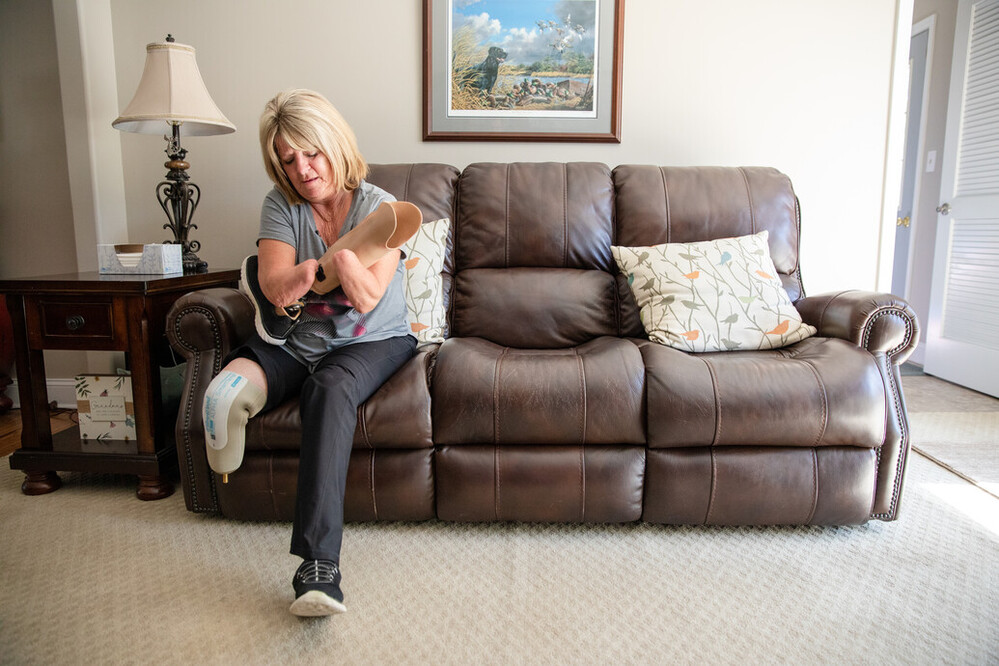
“Why Did I Make It?”
Roberts left Methodist Hospital about a month after the amputations and spent four months at QLI – a specialized rehabilitation center – learning to use her prostheses and fine-tuning the skills she’d need to live independently.
In many ways, she exceeded expectations after returning home in the spring of 2015 – but with some adjustments.
The body-powered prosthetic hooks meant to replace some hand function?
“The first time I put the first one on, it was hard and cold, and I refused to wear it. I need that sense of touch.”
The myoelectric prosthesis that her grandkids call a “robotic hand”? She was never interested in using it throughout the day, although she has found a use for it – “an awful expensive deodorant applicator.”
With the help of some adaptive equipment, Roberts resumed many of her hobbies and activities – driving, gardening, mowing the lawn and watching her grandchildren. She’s happy to clean up after meals, but she leaves the cooking to her husband now.
“Trying to use a spatula isn’t a pretty sight,” she joked.
But that’s not where Roberts’ remarkable story ends. Even as life returned to a semblance of normalcy, she felt like something was missing.
“There’s a reason why I’m still here,” Roberts remembered thinking after a few years. “I shouldn’t have made it. So I kept thinking, why? Why did I make it? Then I thought, ‘I want to give back.’”
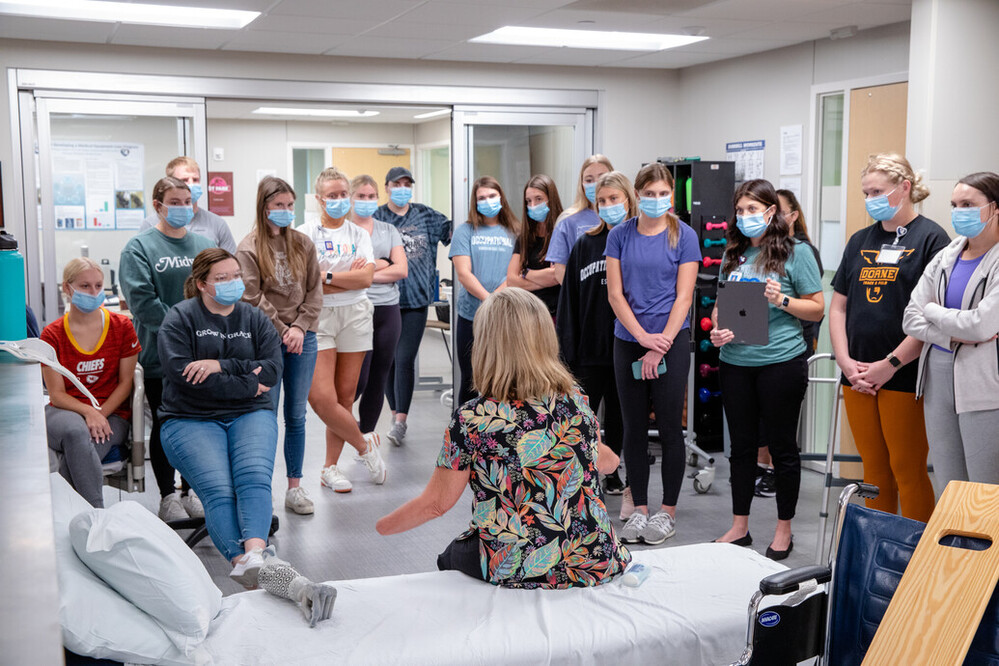
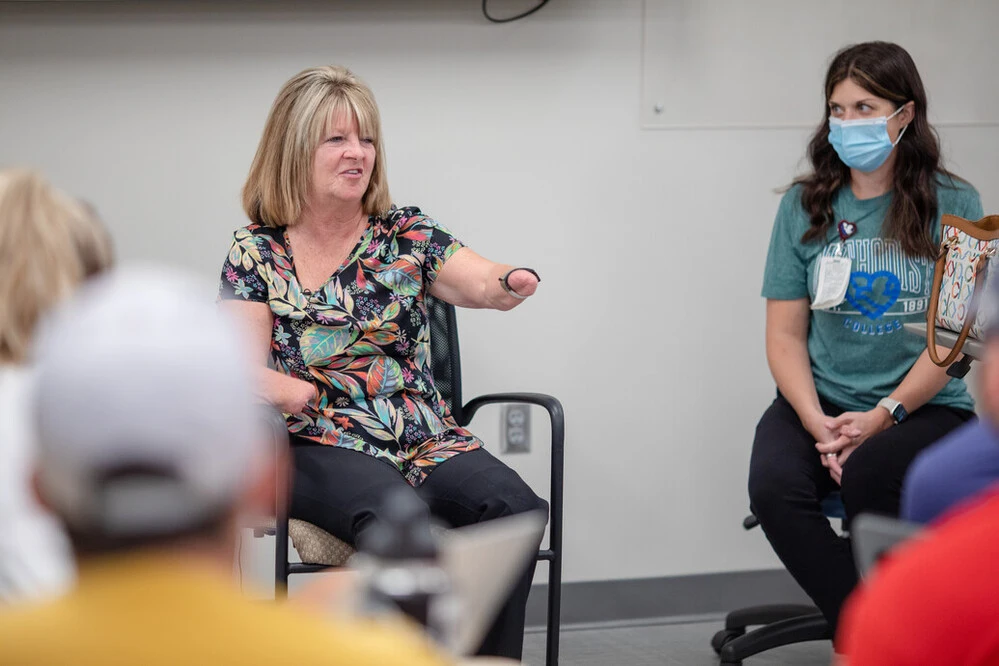
“A Lot To Live For”
Roberts had made the decision to become a volunteer, and she instantly knew where: the Acute Rehabilitation Center. She could never forget how its therapists had pushed her to succeed and nurtured her initial instincts to keep fighting.
“They were the ones encouraging me that there’s still life after these amputations,” she said. “You still have a lot to live for.”
Now she wanted to help spread that message. She called Balak to ask about volunteering, and within weeks she was making the rounds – visiting patients recovering from amputations, strokes, heart attacks, spinal cord injuries and other acute issues.
“When I start talking to patients, my whole thing is that you’ve got to embrace the new you, whatever it is,” Roberts said. “I say embrace it because there’s a lot of good life ahead of you. You’re going to have your down days, which I think we deserve. We’ve earned them. The key is, don’t stay in your down days.”
In addition to the informal chats, Roberts takes part in Amputee Chat discussions on the unit, offering advice and encouragement for patients starting down the same path she’s taken. She also visits an occupational therapy class at Nebraska Methodist College (NMC), sharing her experience with students and giving them unique insights into what they may encounter as they begin working in acute care settings.
“It’s one thing for an instructor to say, ‘This is going to change your life. These patients are going to challenge you and motivate you. You’re going to love this career,’” said Wieger, who also teaches the NMC course. “It doesn’t ring the same way when I say it as it does when a patient shares their story in class with the students.”
Macy Gustafson was among the students who heard Roberts’ story during a class in September. Gustafson said seeing how far Roberts has come “was pretty jaw dropping” and can only benefit her as she heads to Mary Lanning Healthcare in Hastings, Nebraska, for her occupational therapy field work next semester.
“Hearing from an actual patient of what they went through, how they had to adapt to the world and their environment when they got home, I think it was beneficial,” she said. “Especially for me, possibly going to see that in an acute care setting.”
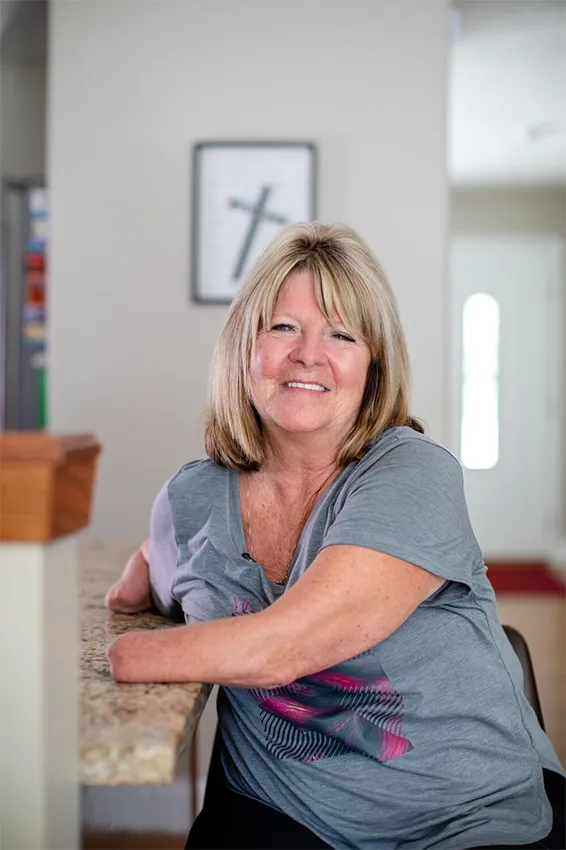
Simple, Special Moments
With each patient Roberts visits, she’s reminded of how far she’s come – and that she’s right where she needs to be.
“I just love doing this,” she said. “My goal is to bring encouragement to somebody, or maybe just simple friendship. A smile. A conversation for a few minutes. If I can bring that to one person, I’m happy.”
That’s exactly what happened as she visited John in September. After trading stories about their health, Roberts talked about what he might expect during his recovery. Then the two began joking around as they found more common ground: They were both fans of a bar in John’s hometown of Memphis, Nebraska, that’s known for its fish fries.
The visit lasted about 10 minutes, but afterward John said meeting Roberts meant the world to him.
“There’s a special place in heaven for people like that,” he said. “I was beginning to feel encouraged as I was talking to her, knowing that there is a light at the end of the tunnel.”
Photos and video by Daniel Johnson
More Resources
- Read more from the winter 2022 issue of The Meaning of Care Magazine.
- Learn more about volunteering at Methodist Hospital.
- Find volunteer opportunities across Methodist Health System.


